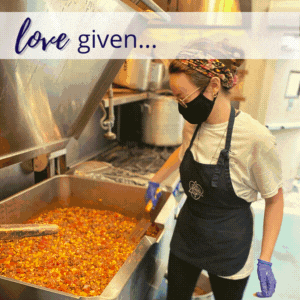Update from Gabby – March 19, 2020
Since writing this blog, the novel coronavirus has reached a pandemic scale, disrupting lives and crippling the economy. The Loretto Volunteers in St. Louis remain healthy and are practicing social isolation. This unprecedented time reminds us that the health of the most vulnerable among us determines the health of us all. We must demand a response that centers the needs of the most marginalized communities, specifically focusing on the well-being of those who are unhoused, undocumented, detained, and disabled. Even while we create social distance, let us remember, with both our thoughts and our actions, that we are all inextricably connected.
A Tribute to Dangerous Women
This narrative has already been written. The narrative of women persisting and resisting. The narrative of women defying structures and trekking a path of justice. Nevertheless, I would be doing a disservice if I did not recognize the dangerous women that I live among. This is an account of their boldness and bravery. Ever since beginning my year of service at St. Francis Community Services, my eyes have been opened to the ways in which women, especially women of faith, lead liberation movements.
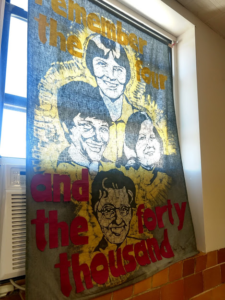
Banner of Ita, Dorothy, Jean, and Maura on the wall of IFCLA
Everyday, I see a banner hanging from my housemate’s (a fellow Loretto Volunteer) office wall. On the banner are the faces of four women: Ita Ford, Dorothy Kazel, Jean Donovan, and Maura Clarke. These four women have long been role models for me. On December 2nd, 1980, they were brutally murdered by the military government of El Salvador. Ita, Dorothy, Jean, and Maura are often remembered for their deaths. However, it is their life of solidarity that makes them unforgettable. All four women were Catholic activists, three of them serving as Sisters. After seeing the devastation of U.S. militarism in Central America, they made the decision to accompany the people of El Salvador. They shared in the suffering and pain of their communities as they became more active in social movements. The women knew the extreme danger that they were in. The United States was training and arming the military government, leaving tens of thousands of people dead.
Ita, Dorothy, Jean, and Maura were audacious women. They radically practiced their faith by upholding the dignity of those who had fallen victim to U.S. foreign policy. The lives of these four women reveals the key role of women of faith in liberation movements. In a world of glaring injustices, they choose to stand in solidarity with the poor, and it is their Catholic faith that urges them to do so. In John 15:13, Jesus says, “Greater love has no one than this: to lay down one’s life for one’s friends.” Women of faith willingly step into danger in order to work for political and economic change. Their lives exemplify the political and the religious merging. They practice their faith in a radical way, leaning into Jesus’ teachings of resisting oppression and loving your neighbor. They are bold, brave, and tireless.
The Civil War in El Salvador lasted until 1992. Four years later, the United States sent thousands of Los Angeles gang members back to El Salvador, leading to an unprecedented surge in gang violence. Due to this violence, the people of El Salvador and other Central American countries are now fleeing to the United States. St. Francis Community Services, along with other area organizations, walks with those migrants arriving in Missouri.
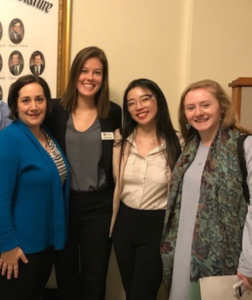
IFCLA, MIRA, and St. Francis Community Services testifying in Jefferson City (Photo credit: JCRC)
Everyday, as I look around me, I see women boldly advocating for justice. I used to think that Ita, Dorothy, Jean, and Maura were heroines whose bravery was unmatched. This year, however, I have come to realize that this practice of women boldly living into their values is not as rare as I once thought. In the face of inhumane policies and divisive rhetoric, women in St. Louis are exemplifying a courageous and radical kind of love. At both St. Francis Community Services and our partnering agencies, I work with immigration activists who, in various ways, tirelessly advocate for justice. They are case managers, bilingual therapists, immigration attorneys, and community organizers. I have witnessed these women living into the counter-cultural belief of loving all people. They are struggling and resisting. They are teaching me what it looks like to stand in solidarity with migrants.
Throughout the year, St. Francis Community Services co-hosts pro-se asylum clinics. These clinics are an attempt to fill a shortage in legal services. There are not enough immigration lawyers in St. Louis, leaving asylum seekers to represent themselves in court. In Missouri, 89% of asylum seekers that are not represented by an attorney are denied asylum (https://trac.syr.edu/immigration/reports/judgereports/00415KAN/index.html). These clinics try to prepare each person to argue their cases in a meaningful way. Each pro-se clinic lasts for approximately 12 hours on a Saturday. They are exhausting and emotional. They are also a testament of community. A testament of the power of women united.
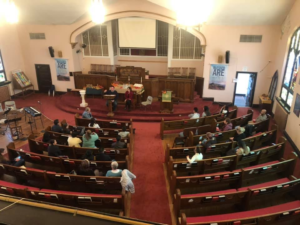
Mock trial at the pro-se asylum clinic (Photo credit: IFCLA).
A group of strong and tenacious women spend months planning and an insurmountable amount of energy executing each clinic. The group is made up of women from several different non-profits, including St. Francis Community Services, the Inter-Faith Committee on Latin America, and the Migrant and Immigrant Community Action Project. Their radical faith and righteous anger guide them to show up for their neighbors. These women organize lawyers and other volunteers to assist asylum seekers in completing the filing process and determining their arguments. As a floating volunteer, I am able to observe the community uniting at these clinics. I see bilingual therapists offering support as asylum seekers recount their trauma. I see women from the church tackling any technical difficulties that arise. I see non-immigration lawyers navigating the complex immigration system with persistence and humility. This steadfast work, along with the strength and bravery of those who attend, gives participants a real chance to seek protection in the United States.
The values that compelled those Catholic activists to stand in solidarity with the poor are the same values that are engraved in the hearts of the immigration activists in St. Louis. I have heard Ita, Dorothy, Jean, and Maura called dangerous women. I would also consider my co-workers dangerous. What is more dangerous than a woman who tirelessly pursues justice? The lives of Ita Ford, Dorothy Kazel, Jean Donovan, and Maura Clarke have informed how I engage in struggles for social justice. The lives of the women I work with have also shown me how to truly practice love in action. In both cases, I have seen women laying down their lives for a friend. No greater love exists.
Be sure to follow CVN’s blog to hear more about Gabby’s service journey!
 Gabriele Eissner is a volunteer with the Loretto Volunteer Program and a CVN Serving with Sisters Contributor. This blog series is sponsored by our VOCARE Initiative, thanks to the support of the Conrad N. Hilton Foundation.
Gabriele Eissner is a volunteer with the Loretto Volunteer Program and a CVN Serving with Sisters Contributor. This blog series is sponsored by our VOCARE Initiative, thanks to the support of the Conrad N. Hilton Foundation.

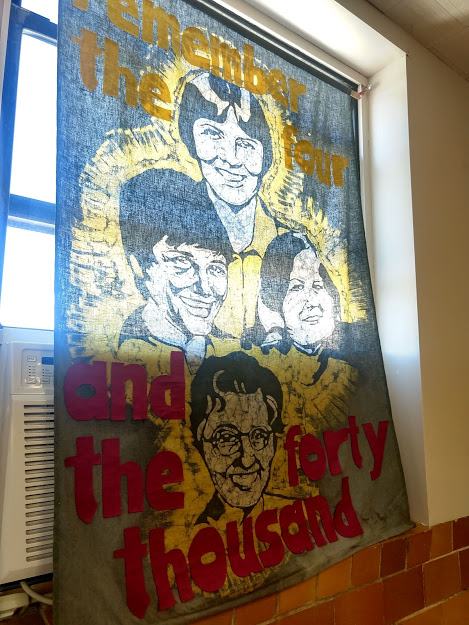
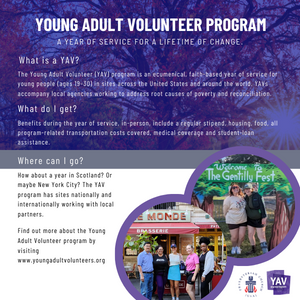
 Thousands of faith-based service opportunities can be at your fingertips with the RESPONSE. Download the latest edition today!
Thousands of faith-based service opportunities can be at your fingertips with the RESPONSE. Download the latest edition today!
